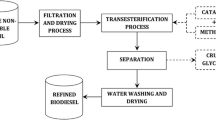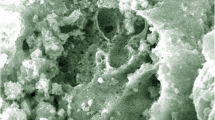Abstract
Owing to the fast depletion of fossil fuels and their skyrocketing price due to the tremendous demand, they become imperative to find renewable alternative fuels for diesel engines. Vegetable oils and their mix with diesel in various proportions, called biodiesel, have been found to be very useful in reducing the alarming consumption of fossil fuels. In the present investigation, lemongrass oil is used as an alternative fuel. The availability of lemongrass oil is adequate for Tamil Nadu and Kerala. The coating material chosen is the partially stabilized zirconium because it has low thermal conductivity and high thermal coefficient. The piston top face, cylinder head, inlet valve and the outlet valve are coated. The purpose of low heat rejection engine or coated engine during the combustion process less heat is rejected by insulating materials. In the current work, the experiment is carried out with lemongrass oil with water emulsion and diesel in a four-stroke direct ignition engine with coating and without coating at various load conditions. The diesel engine run with lemongrass oil–water emulsion (94% LGO + 5% water + 1% surfactant), and low heat rejection engine performed better and gave better brake thermal efficiency compared with raw lemongrass oil–water emulsion blend at peak load. Then, the brake-specific fuel consumption of lemongrass oil–water emulsion in the coated engine was 325 (g kW−1 h−1) which was lower than that of lemongrass oil–water emulsion (94% LGO + 5% water + 1% surfactant) in the uncoated engine. Further, combustion parameter of lemongrass oil–water emulsion blend tested in coated engine produced 60 bars in-cylinder pressure, and it was better than lemongrass oil–water emulsion in the uncoated engine. Both the cumulative heat release rate and the heat release rate were in superior range compared with lemongrass oil–water emulsion in the uncoated engine. As regards tailpipe emission, the lemongrass oil–water emulsion blend in the coated engine at peak load delivered a steep reduction in carbon monoxide, hydrocarbon and smoke emission of base diesel blend in the uncoated engine. But, on the contrary, NOx and CO2 emissions were steeply higher compared with the diesel blend that powered the uncoated engine. The entire tested parameters led to the conclusion that lemongrass oil–water emulsion used in the coated diesel engine would be a healthier and economical substitute fuel for hydrocarbonated fuels.
Graphical abstract














Similar content being viewed by others
Abbreviations
- LGWE UE:
-
(94% LGO + 5% water + 0.5% Span, 0.5% Tween) for uncoated engine
- LGWE CE:
-
(94% LGO + 5% water + 0.5% Span, 0.5% Tween) for coated engine
- LGO:
-
Lemongrass oil
- LHR:
-
Low heat rejection engine
- CE:
-
Coated engine
- CI:
-
Compression ignition
- CO:
-
Carbon monoxide
- HC:
-
Hydrocarbon
- NOx :
-
Oxides of nitrogen
- BTE:
-
Brake thermal efficiency
- BSFE:
-
Brake-specific fuel energy
- ID:
-
Ignition delay
- CA:
-
Crank angle
References
Mahmudul HM, Hagos FY, Mamat R, Adam AA, Ishak WFW, Alenezi R. Production, characterization and performance of biodiesel as an alternative fuel in diesel engines a—review. Renew Sustain Energy Rev. 2017;72:497–509.
Miri SMR, Seyedi SRM, Ghobadian B. Effects of biodiesel fuel synthesized from non-edible rapeseed oil on performance and emission variables of diesel engines. J Clean Prod. 2017;142:3798–808.
Sathiyamoorthi R, Sankaranarayanan G. Effect of antioxidant additives on the performance and emission characteristics of a DICI engine using neat lemongrass oil–diesel blend. Fuel. 2016;174:89–96. https://doi.org/10.1016/j.fuel.2016.01.076.
Vinukumar K, Azhagurajan A, Vettivel SC, Vedaraman N. Rice husk as nanoadditive in diesel–biodiesel fuel blends used in diesel engine. J Therm Anal Calorim. 2018;131:1333–43. https://doi.org/10.1007/s10973-017-6692-7.
Thirunavukkarasu M, Ravindran R, Saravanan CG, Rajamanickam N, Syed Aalam C, Ragupathy K. Synthesis and characterization of gaseous fuel from Jatropha oil through catalytic reactor and its performance in DI diesel engine. J Therm Anal Calorim. 2018;1:1. https://doi.org/10.1007/s10973-018-7725-6.
Tamilvanan A, Balamurugan K, Vijayakumar M. Effects of nano-copper additive on performance, combustion and emission characteristics of Calophyllum inophyllum biodiesel in CI engine. J Therm Anal Calorim. 2018;1:1. https://doi.org/10.1007/s10973-018-7743-4.
Dhinesh B, Annamalai M, Lalvani IJR, Annamalai K. Studies on the influence of combustion bowl modification for the operation of Cymbopogon flexuosus biofuel based diesel blends in a DI diesel engine. Appl Therm Eng. 2017;112:627–37.
Varuvel EG, Mrad N, Tazerout M, Aloui F. Experimental analysis of biofuel as an alternative fuel for diesel engines. Appl Energy. 2012;94:224–31.
Han X, Yang Z, Wang M, Tjong J, Zheng M. Clean combustion of n-butanol as a next generation biofuel for diesel engines. Appl Energy. 2017;198:347–59.
Dhinesh B, Annamalai M, Lalvani IJR, Annamalai K. An assessment on performance, emission and combustion characteristics of single cylinder diesel engine powered by Cymbopogon flexuosus biofuel. Energy Convers Manag. 2016;117:466–74.
Hasannuddin AK, Wira JY, Sarah S, Aqma WWS, Hadi AA, Hirofumi N, Aizam SA, Aiman MAB, Watanabe S, Ahmad MI, Azrin MA. Performance, emissions and lubricant oil analysis of diesel engine running on emulsion fuel. Energy Convers Manag. 2016;117:548–57.
SenthilKumar P, Sankaranarayanan G. Investigation on environmental factors of waste plastics into oil and its emulsion to control the emission in DI diesel engine. Ecotoxicol Environ Saf. 2016;134:440–4.
Senthil Kumar M, Jaikumar M. A comprehensive study on performance, emission and combustion behavior of a compression ignition engine fuelled with WCO (waste cooking oil) emulsion as fuel. J Energy Inst. 2014;87:263–71.
Abedin MJ, Masjuki HH, Kalam MA, Sanjid A, Ashraful AM. Combustion, performance, and emission characteristics of low heat rejection engine operating on various biodiesels and vegetable oils. Energy Convers Manag. 2014;85:173–89. https://doi.org/10.1016/j.enconman.2014.05.065.
Garud V, Bhoite S, Patil S, Gaikwad N, Ghadaged S, Kutef D, Sivakumar G. Performance and combustion characteristics of thermal barrier coated (YSZ) low heat rejection diesel engine. Mater Today Proc. 2017;4:188–94.
Li T, Caton JA, Jacobs TJ. Energy distributions in a diesel engine using low heat rejection (LHR) concepts. Energy Convers Manag. 2016;130:14–24. https://doi.org/10.1016/j.enconman.2016.10.051.
Vedharaj S, Vallinayagam R, Yang WM, Chou SK, Chua KJE, Lee PS. Experimental and finite element analysis of a coated diesel engine fuelled by cashew nut shell liquid biodiesel. Exp Thermal Fluid Sci. 2014;53:259–68. https://doi.org/10.1016/j.expthermflusci.2013.12.018.
Prasad VV. Performance of 4 stroke diesel engine using coconut oil as biofuel material. Mater Today Proc. 2017;4:5312–9.
Anandavelu K, Alagumurthi N, Saravanan G. Performance and emission studies on biofuel-powered Kirloskar TV-1 directinjection diesel engine with exhaust gas recirculation. Int J Sustain Energ. 2014;30:66–9. https://doi.org/10.1080/14786451.2011.590590.
Vara Prasad V. Performance of 4 stroke diesel engine using coconut oil as biofuel material. Mater Today Proc. 2017;4:5312–9.
Anandavelu K, Alagumurthi N, Saravanan G. Performance and emission studies on biofuel-powered Kirloskar TV-1 directinjection diesel engine with exhaust gas recirculation. Int J Sustain Energ. 2014;30:66–9. https://doi.org/10.1080/14786451.2011.590590.
Subramanian KA, Singal SK, Saxena M, Singhal S. Utilization of liquid biofuels in automotive diesel engines: an Indian perspective. Biomass Bioenerg. 2005;29:65–72. https://doi.org/10.1016/j.biombioe.2005.02.001.
Venu H, Madhavan V. Effect of nano additives (titanium and zirconium oxides) and diethyl ether on biodiesel-ethanol fuelled CI engine. J Mech Sci Technol. 2016;30:2361–8.
Adgia KC, Shah DO. On the vaporization behavior of water-in-oil microemulsions. Combust Flame. 1990;80:412–4. https://doi.org/10.1016/0010-2180(90)90117.
Balasubramanian D, Arumugam SRS, Subramani L, Chellakumar IJLJS, Mani A. A numerical study on the effect of various combustion bowl parameters on the performance, combustion and emission behavior on a single cylinder diesel engine. Environ Sci Pollut Res. 2018. https://doi.org/10.1007/s11356-017-0565-2.
Krishna MVSM, Prakash TO, Ushasri P, Janardhan N, Murthy PVK. Experimental investigations on direct injection diesel engine with ceramic coated combustion chamber with carbureted alcohols and crude jatropha oil. Renew Sustain Energy Rev. 2016;53:606–28. https://doi.org/10.1016/j.rser.2015.09.011.
Prabhahar M, Rajan K. Performance and combustion characteristics of a diesel engine with titanium oxide coated piston using Pongamia methyl ester. J Mech Sci Technol. 2013;27(5):519–1526. https://doi.org/10.1007/s12206-013-0332-3.
Baskar P, Senthilkumar A. Effects of oxygen enriched combustion on pollution and performance characteristics of a diesel engine. Eng Sci Technol Int J. 2015;2015(77):1–6. https://doi.org/10.1016/j.jestch.2015.08.011.
Palash SM, Masjuki HH, Kalam MA, Masum BM, Sanjid A, Abedin MJ. State of the art of NOx mitigation technologies and their effect on the performance and emission characteristics of biodiesel-fuelled compression ignition engines. Energy Convers Manag. 2013;76:400–20. https://doi.org/10.1016/j.enconman.2013.07.059.
Venu H, Madhavan V. Influence of diethyl ether (DEE) addition in ethanol–biodiesel–diesel (EBD) and methanol–biodiesel–diesel (MBD) blends in a diesel engine. Fuel. 2017;189:377–90.
Khalife E, Tabatabaei M, Demirbas A, Aghbashlo M. Impacts of additives on performance and emission characteristics of diesel engines during steady state operation. Prog Energy Combust Sci. 2017;59:32–78. https://doi.org/10.1016/j.pecs.2016.10.001.
Huo M, Lin S, Liu H, Chia-fon FL. Study on the spray and combustion characteristics of water–emulsified diesel. Fuel. 2014;123:218–29. https://doi.org/10.1016/j.fuel.2013.12.035.
Ithnin AM, Yahya WJ, Ahmad MA, Ramlan NA, Kadir HA, Sidik NAC, Koga T. Emulsifier-free water-in-diesel emulsion fuel: its stability behaviour, engine performance and exhaust emission. Fuel. 2018;215:454–62. https://doi.org/10.1016/j.fuel.2017.11.061.
Venu H, Madhavan V. Effect of diethyl ether and Al2O3 nano additives in diesel–biodiesel–ethanol blends: performance, combustion and emission characteristics. J Mech Sci Technol. 2017;31:409–20. https://doi.org/10.1007/s12206-016-1243-x.
Shahabuddin M, Liaquat AM, Masjuki HH, Kalam MA, Mofijur M. Ignition delay, combustion and emission characteristics of diesel engine fueled with biodiesel. Renew Sustain Energy Rev. 2013;21:623–32. https://doi.org/10.1016/j.rser.2013.01.019.
Senthil Kumar M, Jaikumar M. A comprehensive study on performance, emission and combustion behavior of a compression ignition engine fuelled with WCO (waste cooking oil) emulsion as fuel. J Energy Inst. 2014;87:263–71. https://doi.org/10.1016/j.joei.2014.03.001.
Subramani L, Annamalai K, Parthasarathy M, Lalvani IJR, Moorthy K. Production of Garcinia gummi-gutta methyl ester (GGME) as a potential alternative feedstock for existing unmodified DI diesel engine: combustion, performance and emission characteristics. J Test Eval. 2018;1:1. https://doi.org/10.1520/jte20170246.
Vellaiyan S, Amirthagadeswaran KS. The role of water-in-diesel emulsion and its additives on diesel engine performance and emission levels: a retrospective review. Alex Eng J. 2016. https://doi.org/10.1016/j.aej.2016.07.021.
Riaza J, Gibbins J, Chalmers H. Ignition and combustion of single particles of coal and biomass. Fuel. 2017;1:1. https://doi.org/10.1016/j.fuel.2017.04.011.
Venu H, Madhavan V. Effect of Al2O3 nanoparticles in biodiesel–diesel–ethanol blends at various injection strategies performance, combustion and emission characteristics. Fuel. 2017;186:176–89.
Kumar ARP, Annamalai K, Premkartikkumar SR. Performance comparison of Di diesel engine and LHR engine with bio diesel as fuel. Int Conf Adv Eng Sci Manag. 2012;31:312–6.
Elumalai PV, Annamalai K, Subramani L, Arularasu S, Appu Raja S. Experimental investigation on lemongrass oil–water emulsion in low heat rejection direct ignition diesel engine. J Test Eval. 2019;47:1–16. https://doi.org/10.1520/JTE20170357.
Subramani L, Parthasarathy M, Balasubramanian D, Ramalingam KM. Novel Garcinia gummi-gutta methyl ester (GGME) as a potential alternative feedstock for existing unmodified DI diesel engine. Renew Energy. 2018;125:568–77. https://doi.org/10.1016/j.renene.2018.02.134.
Ramalingam KM, Kandasamy A, Subramani L, Balasubramanian D, Thadhani JP. An assessment of combustion, performance characteristics and emission control strategy by adding anti-oxidant additive in emulsified fuel. Atmos Pollut Res. 2018;1:1. https://doi.org/10.1016/j.apr.2018.02.007.
Dhinesh B, Raj YMA, Kalaiselvan C, Krishnamoorthy R. A numerical and experimental assessment of a coated diesel engine powered by high-performance nano biofuel. Energy Conserv Manag. 2018;171:815–24. https://doi.org/10.1016/j.enconman.2018.06.039.
Acknowledgements
The author sincerely thanks Dr. K. Annamalai, Ph.D. Assistant Professor, Department of Automobile Engineering, Anna University (MIT Campus), for his valuable guidance throughout the research work. The author also thanks Dr. V. P. Ramamoorthy, former Professor of Anna University and present Managing Trustee of Dhanalakshmi College of Engineering, for his motivation and support for the research work.
Author information
Authors and Affiliations
Corresponding author
Rights and permissions
About this article
Cite this article
Elumalai, P.V., Annamalai, K. & Dhinesh, B. Effects of thermal barrier coating on the performance, combustion and emission of DI diesel engine powered by biofuel oil–water emulsion. J Therm Anal Calorim 137, 593–605 (2019). https://doi.org/10.1007/s10973-018-7948-6
Received:
Accepted:
Published:
Issue Date:
DOI: https://doi.org/10.1007/s10973-018-7948-6




